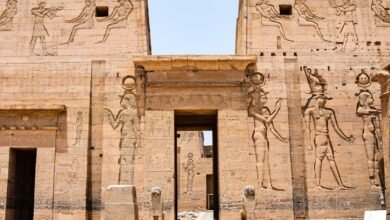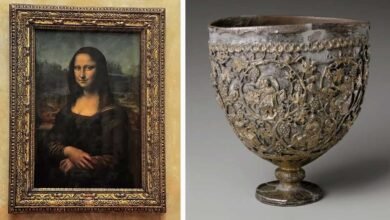Unveiling Bulgaria’s Shining Enigma: The Saga of the Etruscan Orphic Codex

Within the annals of time, countless enigmas await discovery, and among these, one artifact gleams with exceptional brilliance—the Gilded Codex of Orpheus, an exquisite treasure now housed in Bulgaria’s National Historical Museum in Sofia. This ancient relic not only offers a portal to the past but also stands as a testament to the artistry and spiritual quests of ancient civilizations.
The Journey to Unearth a Hidden Treasure
The mesmerizing saga of the Golden Orphic Codex commenced some seven decades ago when a soldier, laboring on a canal project near the Struma River, unexpectedly unearthed a relic of unfathomable historical significance. Little did he know that his chance discovery would unveil one of the world’s earliest preserved books.
Dating back to around 660 BC, this remarkable codex comprises six golden leaves, each measuring a mere 5 cm by 4.5 cm. Forged from 23.82-karat gold, these pages are delicately bound together using golden rings, forming a spellbinding masterpiece. Astonishingly, the entire artifact weighs a mere 100 grams, a testament to the skill and precision of its ancient creators.
Etruscan Influence and Its Cultural Significance
The enigmatic inscriptions on the codex are etched in Etruscan characters, a language associated with the Etruscans—an ancient civilization that originated in Lydia (modern-day Turkey) and later settled in central Italy nearly three millennia ago. The plates are adorned with illustrations depicting an array of symbols and figures, including a horse, a horseman, a siren, a lyre, and soldiers, providing a window into the diverse cultural landscape of that era.
The Etruscan text and the imagery woven into the plates hint at a connection to mystical rites and beliefs linked to the realm of the afterlife. Scholars suggest that this artifact is connected to the funerary rituals of an aristocrat who was a devoted follower of the Orphic cult, a belief system deeply rooted in the mythic tales of Orpheus.

The Orphic Thread
Orphism, closely intertwined with Thracian and Hellenistic traditions, experienced a resurgence in the 6th century BC, championed by the Greek philosopher Pythagoras. Its origins in Thrace, an ancient region that encompasses parts of modern-day Bulgaria, infuse the discovery of the Gilded Etruscan Orphic Codex with added significance. The connection with Etruscan culture underscores the intricate tapestry of beliefs that once intermingled in the ancient world.
What sets this particular artifact apart is the fact that, while isolated pages from Etruscan “Orpheus” books have been discovered in various corners of the globe, only in Bulgaria has a complete codex been found, with its pages still interlinked by golden rings.
Present Status and Ongoing Research
Generously bequeathed to Bulgaria’s National History Museum by an anonymous 87-year-old benefactor, the codex now resides in the depths of the NIM Cellar. It has undergone exhaustive examination by experts in both Sofia and London, and dedicated efforts are underway to decipher its inscriptions and unravel its enduring mysteries.
The revelation of the Gilded Etruscan Orphic Codex serves as a poignant reminder of the interconnectedness of ancient civilizations and the rich cultural heritages they left in their wake. As scholars and historians labor to unlock its secrets, this golden relic remains a guiding beacon, spanning the chasm between antiquity and the present, a testament to humanity’s age-old quest for knowledge and insight. It underscores that, even in our technologically advanced age, there are still golden secrets waiting to be unearthed, connecting us to the profound enigmas of bygone eras.
Read more at: www.thearchaeologist.org




